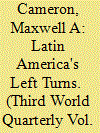| Srl | Item |
| 1 |
ID:
086015


|
|
|
|
|
| Publication |
2009.
|
| Summary/Abstract |
In rapid succession leftwing parties have been elected to government in some of the most important countries in the Latin American region. I challenge the view that there are two distinct variants of the left-one populist, the other social democratic-and argue that variation on the left reflects the diverse conditions under which these forces emerge and evolve. I outline common features shared by the left in Latin America; suggest how the concept of populism and analysis of social movements can help explain this variation; and show how the left's commitment to egalitarianism, balancing markets, and, in some cases, its appeals to the constituent power of the people enabled it to benefit from disillusionment with the results of neoliberalism, the poor performance of democratic governments in Latin America, and the evolving international context.
|
|
|
|
|
|
|
|
|
|
|
|
|
|
|
|
| 2 |
ID:
086017


|
|
|
|
|
| Publication |
2009.
|
| Summary/Abstract |
The left turns represent a 'second incorporation crisis' for Latin American countries. The discontent emerging from the effects of market reforms implemented in the context of weak states and highly unequal societies has fuelled this crisis, along with citizens' widespread alienation with traditional parties and political elites. The left turns also yield three interrelated paradigmatic crises: one relates to political and economic praxis in the region, another concerns academic interpretations of the political economy of democracy and development for Latin America, and yet another concerns policy-making prescriptions. The failure to predict the left turn epitomises conventional wisdom's shortsightedness, which is also present in the now dominant interpretations on the current governing lefts in the region. A normative predilection for market economies and liberal democracy embedded in the theoretical and methodological toolbox of dominant approaches causes this myopia. The paper justifies this diagnostic and derives implications for future research
|
|
|
|
|
|
|
|
|
|
|
|
|
|
|
|